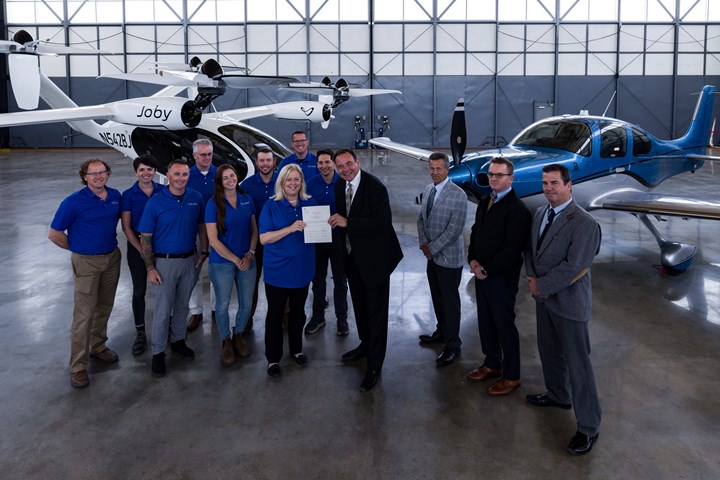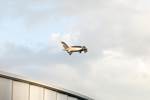Joby receives Part 135 Certification from the FAA ahead of schedule
The certification, initially targeted for the second half of 2022, is another step toward commercial operation. Joby will use conventional aircraft to refine systems and procedures in advance of launching eVTOL service targeted for 2024.
Share
Read Next

Joby’s air operations team pictured receiving the company’s Part 135 Air Carrier Certificate from the FAA’s San Jose Flight Standards District Office. Photo Credit: Business Wire
On May 26 Joby Aviation Inc. (Santa Cruz, Calif., U.S.) announced that it has received a Part 135 Air Carrier Certificate from the Federal Aviation Administration (FAA, Washington, D.C., U.S.), enabling Joby to begin on-demand commercial air taxi operations.
Joby received the certification ahead of schedule, with completion of the process originally expected in the second half of 2022. The five-stage process included the submission of more than 850 pages of manuals for approval and required Joby’s initial cadre of pilots to demonstrate mastery of the company’s procedures and training under FAA observation.
The Part 135 Air Carrier Certificate is one of three FAA approvals required for Joby to operate its composites-intensive electric vertical takeoff and landing (eVTOL) aircraft as an air taxi service in cities and communities across the U.S., alongside a Type Certificate and a Production Certificate.
“The procedures we’ve prepared lay a foundation for our future eVTOL operations,” Bonny Simi, head of air operations and people at Joby, and one of the company’s FAA-approved pilots, states. “Over the coming months, we will use our Part 135 certificate to exercise the operations and customer technology platforms that will underpin our multi-modal ridesharing service, while also refining our procedures to ensure seamless journeys for our customers. Receiving this certificate ahead of schedule is a testament to the dedication and hard work of our team.”
Once Joby receives a type certificate for its eVTOL aircraft, the company says it will complete the FAA review process to add the new aircraft type to its existing air carrier certificate. Pilots for the company’s future aerial ridesharing service, expected to launch in 2024, will have the benefit of flying an environmentally friendly aircraft on a reliable work schedule, ending each shift in their home city.
Joby previously announced a partnership with CAE (Montreal, Canada) to develop and qualify flight simulation training devices that Joby will use to train commercially rated pilots to fly its eVTOL aircraft.
Related Content
-
Next-generation airship design enabled by modern composites
LTA Research’s proof-of-concept Pathfinder 1 modernizes a fully rigid airship design with a largely carbon fiber composite frame. R&D has already begun on higher volume, more automated manufacturing for the future.
-
The potential for thermoplastic composite nacelles
Collins Aerospace draws on global team, decades of experience to demonstrate large, curved AFP and welded structures for the next generation of aircraft.
-
ASCEND program update: Designing next-gen, high-rate auto and aerospace composites
GKN Aerospace, McLaren Automotive and U.K.-based partners share goals and progress aiming at high-rate, Industry 4.0-enabled, sustainable materials and processes.
















